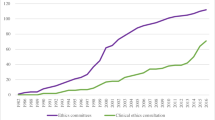Abstract
As part of a project to examine health care ethics consultation in Canada, we surveyed individuals who were considered by themselves or others to play a significant role in health care ethics consultation. Since one goal of the project was to examine the education and abilities necessary for consultants, we sought to determine the qualifications and skills currently possessed by persons considered to be ethics consultants. For the purposes of the questionnaire, ’health care ethics consultation’ was defined broadly to include consultation on ethical issues in clinical care or in clinical research, ethics consultation to Clinical Ethics Committees, Research Ethics Committees, and policy formulation committees in health care institutions; ’clinical ethics work’ was defined more broadly still to include, in addition to the above, ethics education, administration, research and writing on bioethics other than the above, and public speaking.
Three hundred and fifty questionnaires were sent to individuals and institutions across Canada that were thought to have some involvement in health care ethics consultation. Two hundred and fifty-three questionnaires were returned for a response rate of 72%. This report presents initial findings of the study and attempts to provide a comprehensive overview of the current state of ethics consultation within Canada. The survey examines demographics, educational background, time spent on ethics, institutional affiliations, approaches to the role of consultation, research related issues, and attitudes toward certification.
Of the 253 questionnaires returned, 162 were completed by individuals who indicated that they provided some kind of ethics consultation. Of these, 43 indicated that they spent 30% or more of their time in clinical ethics work. These individuals are quite heterogeneous in background, training and activities, and while the great majority of them are based in an academic setting (university or teaching hospital), many act as resources to community hospitals, long-term care facilities and other organizations. Finally, the survey found that respondents' views on the advisability of certification for those offering ethics consultation were split evenly between those in favour of and those against certification.
This report serves, then, as a reference point for studying the roles, responsibilities, training and accreditation of ethics consultants in health care.
Similar content being viewed by others
References
Baylis F. Persons with moral expertise and moral experts. In: Hoffmaster B, Freedman B, Fraser G, eds.Clinical ethics: Theory and practice. Clifton, NJ: Humana Press: 1989:89–99.
Caplan A. Mechanics on duty: The limitations of a technical definition of moral expertise for work in applied ethics.Canadian Journal of Philosophy. 1982; 8:13–16.
Ackerman TF. The role of an ethicist in health care. In: Anderson GR, Glesnes-Anderson MA, eds.Health care ethics: A guide for decision makers. Rockville, MD: Aspen Publishers Inc; 1987:308–20.
Moreno J. Ethics consultation as moral engagement.Bioethics 1991; 5:44–56.
Thomasma DC. Why philosophers should offer ethics consultations.Theorectical Medicine. 1991;12:129–40.
La Puma J, Schiedermayer DL. Ethics consultation: Skills, roles and training.Annals of Internal Medicine. 1991;114(2):155–60.
La Puma J, Priest, ER. Medical staff privileges for ethics consultants: An institutional model.Quarterly Review Bulletin, 1992; 18(1):17–20.
Self DJ, Skeel, JD. Professional liability (malpractice) coverage of humanist scholars functioning as clinical medical ethicists.Journal of Medical Humanities and Bioethics. 1988;9(2):101–10.
Additional information
Funded by the Social Sciences and Humanities Research Council of Canada — Strategic Research Network in Applied Ethics, "Ethics Consultation in Health Care".
Rights and permissions
About this article
Cite this article
Coughlin, M.D., Watts, J. A descriptive study of healthcare ethics consultants in Canada: Results of a national survey. HEC Forum 5, 144–164 (1993). https://doi.org/10.1007/BF01463890
Issue Date:
DOI: https://doi.org/10.1007/BF01463890




